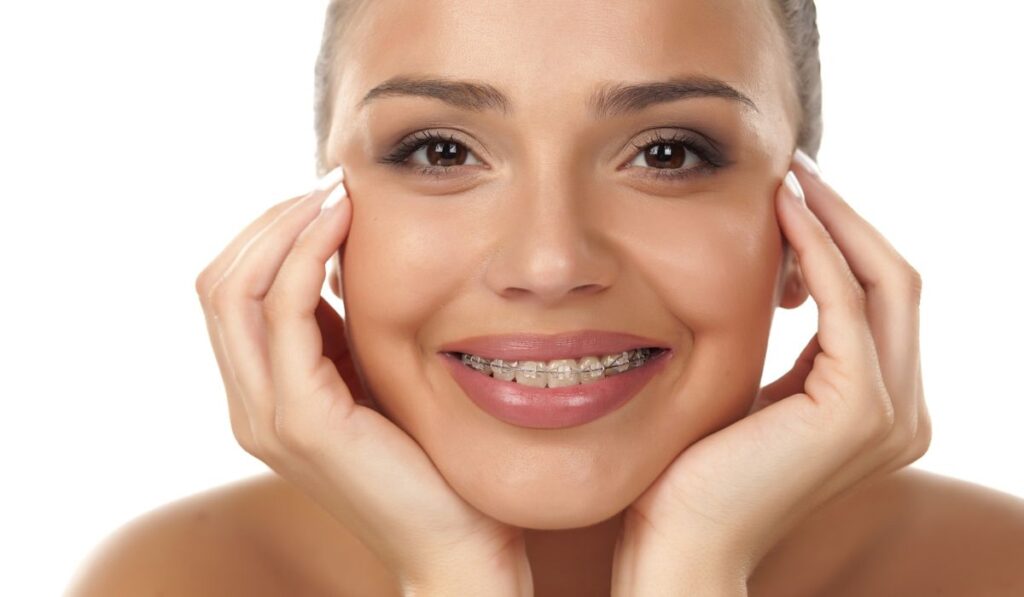One fear people tend to have before getting braces is that the dental devices will alter their facial appearance. That fear is warranted since braces can change the shape of one’s face and reshape certain features like the jaw, lips, and mouth.
Braces can cause your lips to protrude as your teeth are pushed forward when realignment occurs. Braces also provide an extra layer between your lips and teeth, creating the illusion of bigger lips. They don’t make your lips bigger, but they may look bigger.
You should expect some degree of lip protrusion following orthodontic treatment, but your lips won’t grow in size; they’ll simply appear that way. Also, the protrusion won’t be exceedingly prominent. So now, let’s learn more!
How Do Braces Work?

Braces are intricate devices comprising several components, i.e., the archwires, ligatures, power chains, and molar bands. Each component serves a specific function in realigning your teeth.
Oral bones can experience resorption and deposition if enough pressure is applied. Braces rely on this principle to exert constant pressure on your teeth, forcing them to move and realign themselves.
A question commonly asked is how long it takes to correct dental issues. It depends on various factors, including your age, the amount of dental fixing needed, and whether you have any other oral anomalies.
Still, it takes about 6 months to 3 years on average to observe significant results from wearing braces. The reason for the lengthy process is safety measures. To achieve results faster, more pressure would need to be applied. Needless to say, how damaging that will be to your teeth.
Common Issues Braces Can Fix
Braces vary in several aspects; material, size, and shape. The dental problems they can potentially fix reflect that variety. Braces have a proven track record of correcting the following common issues;
Overcrowding
As the name suggests, overcrowding occurs when there isn’t enough space in the mouth to fit all the teeth comfortably. It’s often the result of irregular-sized teeth, narrow palates, or abnormally small jaw.
Braces correct this issue by moving the teeth left, right, forward, and backward to realign them. Unfortunately, this ultimately creates much-needed room in the mouth cavity.
Underbites and Overbites
Typically, your upper and lower teeth are supposed to meet, with your teeth sitting slightly in front of your lower teeth. This is known as the normal bite.
When either the lower and upper teeth extend further than the other, an underbite or overbite occurs. Genetics is the leading cause of bite issues; in some cases, aggressive thumbsucking can bring about the issue.
Open Bite
Open bite is a dental condition in which the upper and lower teeth don’t make contact when the jaw is fully shut. This can occur in the front or the back of the teeth.
This condition is primarily caused by genetics, but several other factors can increase the risk of developing an open bite. Open bites are one of the most complex dental conditions to treat, but Orthodontists usually tackle the issue with a well-calculated combination of braces and other oral devices.
Speech Problems
Among other things, the mouth is an instrument used to create sounds or speech. The tongue needs to make contact with the teeth and roof of the mouth in specific ways to develop coherent speech.
That said, any orthodontic issues can affect one’s speech. For example, lisps, whistling while talking, and other articulation difficulties are speech problems caused by dental issues.
Fixing dental issues with a combination of braces and Invisalign generally gets rid of the problem.
Improves Self-Esteem
People with Orthodontic issues tend to have low self-esteem because they perceive themselves as unattractive, and as shallow as it may be, society perceives dental problems as unattractive.
Braces improve one’s smile and overall oral health and appearance. This gives braces wearers more confidence in themselves.
Can Braces Make Your Lips Bigger?
Braces don’t necessarily make your lips bigger, but they do make them appear bigger. But, again, it’s all a matter of perception. Your lips sit on your teeth, so the position of your teeth largely affects the way they appear on your face.
For instance, correcting an underbite with braces will bring your teeth and lips forward, creating the illusion of larger lips. Similarly, fixing an overbite will make your lips less pronounced.
The position of your teeth isn’t the only factor that may affect your lips. Braces are effective at correcting a wide array of dental problems, but they’re incredibly bulky. They take up a lot of space between your gums and inner lips, which ultimately forces your lips to protrude.
One way to avoid the typical lip protrusion caused by braces is to opt for invisible braces. They’re thinner and flatter than their metal counterparts, so they don’t alter the shape of your lips as much.
The only downside to invisible braces is that they can only correct mild to moderate alignment issues.
Lastly, your lips may appear bigger because they’re swollen. Swollen lips among braces wearers are a very common thing. It comes down to irritation caused by the braces rubbing against the inside of the mouth. Most braces are made from nickel, a material known to be an allergen.
Suppose the swelling in your lips is accompanied by irritation in the inside of your mouth.
In that case, you’re most likely having an allergic reaction to your braces, in which case mild to moderate allergy pills (on Amazon) may relieve the irritation.
Will Your Lips Go Back to Normal After Braces?
Whether your teeth will return to their original size primarily depends on why you needed them in the first place. Braces can potentially correct numerous dental problems, but “overbites” and ”underbites” significantly impact the lips.
Let’s start with an underbite. In this case, the lower teeth overlap the upper teeth.
To fix this issue, orthodontists use a combination of braces and rubber bands to bring the lower teeth backward and slightly bring the upper teeth forward.
On the other hand, to fix an overbite, orthodontists will use the same method, but in this case, the upper teeth will be pushed back while the lower ones are brought forward. In both these cases, the positioning of your teeth and jaw will be altered permanently.
That said, your teeth will not fully go back to normal once you get your braces removed. However, since braces take up a lot of space in your mouth, having them removed will reduce some of the lip protrusion.
Do Braces Change the Rest of Your Face?

Braces don’t just alter the shape of your teeth; they affect the jaw, nose, and other parts of the face. The science behind it is that bones need to be shifted in all directions to primarily correct dental problems and achieve the perfect smile.
In that sense, yes, braces will change the rest of your face. Even parts of your face that aren’t affected will appear differently than they normally do.
This type of change is more prominent in children and growing teenagers. However, their bones are still growing and thus more malleable. That’s why orthodontic treatment is recommended for children and adolescents.
Adults don’t generally notice a drastic change in their facial features; some don’t notice any change. It all depends on the length and intensity of their treatment.
Do Braces Make You More Attractive?
The idea that braces make people more attractive is one of the primary reasons an increasing number of adults get braces later in their lives. Specifically, 25% of braces wearers in the U.S. are adults.
Whether braces make you more attractive is subjective, but it makes your face more symmetrical, giving you the ”perfect” smile and enhancing other parts of your face.
Conclusion
After getting braces, your lips will protrude further than they usually do, and that’s normal. However, you’ll also notice changes in certain parts of your face.
This is the result of braces correcting discrepancies in your features and making your face more symmetrical. Once your braces are removed, your lips won’t necessarily go back to normal, but they’ll appear less prominent.


